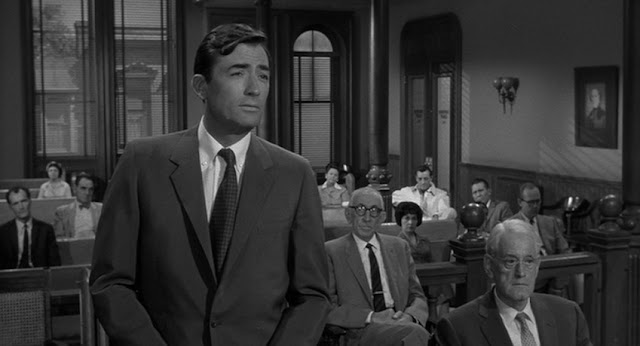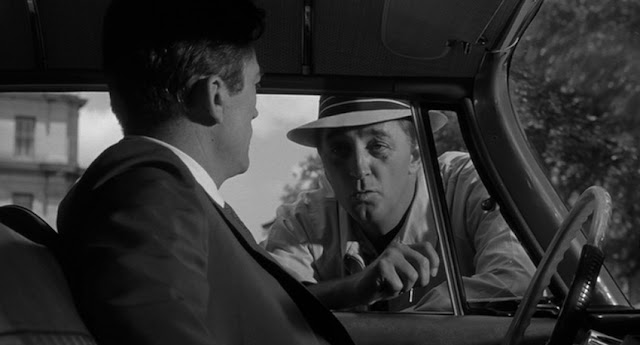


Historically, Cape Fear comes at a transitional period in American Film making. Released in 1962, it came at the very tail end of the period of classic noirs. The 60s were late enough in film history that some directors were already beginning to subvert the genre, although as you might have guessed, most of those directors were not American. Over in France, Jean-Luc Godard was already loosing his aimless gangsters and girlish femme fatales onto the streets of France. But, this J. Lee Thompson film plays it straight. What results is a sort of atypical noir that is stylistically intricate in the vein of Cat People or Diabolique, with a sort of psycho-sexual bent.



This movie was extremely controversial when it came out. Perhaps this is because it examines the idea of sexual consent in a way that would probably still make a lot of people uncomfortable. In many places, it is easy for a man to get away with rape, because of an age-old set of prejudices about what women can and can't do, and how they should and shouldn't behave. The villain of Cape Fear is an extreme example, which makes him all the more demonstrative. Max Cady (Robert Mitchum) is a recently released sex offender who goes after Sam Bowden (Gregory Peck), the lawyer who put him away. As is the case with most highly intelligent movie villains, Cady knows that the best way to enact his revenge is in a more lasting way than simple harassment or murder. Although he never comes out and says it, his intentions are clear: he plans to rape Bowden's lovely daughter and wife.



Cady knows the law, inside and out. Thus, he knows that rape is an incredibly tricky legal morass, wherein a girl's consent, however subtle, can acquit you. Although you never witness this, the idea is that Cady manages to somehow scare or beat women into saying that they gave consent, that they wanted it. Robert Mitchum is the quintessential actor if you want to portray both cunning and masculine power; he has both in droves. I loved him in this, because it reminded me so much of his role in Night of the Hunter. Throughout the movie, you utterly despise him, but you also can't stop yourself from thinking that everyone looks like an utter fool when compared with him.


What better prop to highlight Cady's masculine assets than a plump cigar? Perhaps a low angled camera. The point is driven home; Max Cady is full of vitality, however poisonous it might be. His very sight sets women quivering with something between arousal and dread.



<

Many noirs evade legal boundaries by utilizing a private investigator who is outside of the legal system. The hard boiled PI always takes the moral high ground, even if it is outside the law. Being a laywer, Bowden is confined by the law, which Cady uses to manipulate him. Sam Bowden makes some moral, not to mention legal mistakes. After Cady refuses his monetary offering, Bowden hires a few men to beat some sense into Cady. These weaselly actions just serve to highlight Bowden's dwindling masculinity, and his increasing failure to protect his family. He is grasping at straws, and losing his moral high ground at the same time. After his roughing up, Cady will stop at nothing to ensure that Bowden is punished.


The plan is, then, to move the family out to a house boat on Cape Fear, while Sam feigns a separate trip of his own. Once the women are out in the cape amongst the reeds and the trees, they really become trapped animals, framed in windows as if in the cross hairs of a rifle. Of course, Cady needs no real weapon. This is one of the more amazing aspects of his character. Thus, when Sam does conquer Cady with a gun, it almost seems like a petty victory. In the end, this movie is upsetting for a plethora of reasons. Most offensive to me is the way the women become totally defenseless when they encounter Max Cady. They are helpless in the focus of a male gaze with such destructive intent. Often, Sam's battle to protect his wife and daughter seems like a defense of territory, or a defense of his own manhood. His position as their protector is called into question, and the movie is a demonstration of his redemption. The women are just a side note.

any one know the make of the cool jacket he wears ?
ReplyDelete